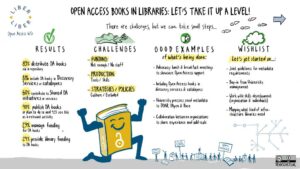LIBER’s Open Access Commitment: Achievements & A Renewed Call to Action
LIBER’s five-year Strategy — covering the period 2018-2022 — includes as a key pillar the vision of a research landscape in which Open Access is the predominant form of publishing.
With the midpoint of our ambitious strategy approaching, we reflect on what has been achieved so far and look ahead to continuing to further Open Access in the coming years.
LIBER’s commitment to Open Access as the main mode of scholarly communication has already been shown in many ways.
Our Open Access Working Group shares knowledge related to many aspects of Open Access dissemination of scholarship. Within the group and LIBER as an organisation, we are proud that we have collaborated with stakeholders to:
- Identify opportunities for research libraries to take a leading role in promoting Open Access.
- Encourage all routes to Open Access.
- Prioritise transparency.
- Inform and provide guidelines for our network.
- Act as an Open Access publisher for the research library community.
- Support critical Open Access infrastructure.
Our work in each of these areas is detailed below.
1. Identify opportunities for research libraries to take a leading role in promoting Open Access.
Our Open Science Roadmap recommends that libraries ensure an Open Access mandate is in place at their institution, commit to following our Five Principles when conducting Open Access negotiations with publishers, and examine new, open models for journal delivery.

2. Encourage all routes to Open Access.
In Plan S consultations, we underlined the importance of the Green Road as a way of reaching full and immediate Open Access. We also emphasized the key role of research libraries in advocating for and encouraging the negotiation of Transformative Agreements, in a joint statement with the International Alliance of Research Library Associations.
3. Prioritise transparency.
In our discussions and recommendations, we emphasize the importance of transparency for Open Access pricing models. The practices of libraries should fully reflect their commitment to Open Access, and licensing agreements should, therefore, be openly available.
4. Inform and provide guidelines for our network.
In 2019, insights on Best-Practices, Opportunities & Challenges related to Open Access Monographs were released. A workshop on the same topic was presented at our Annual Conference, along with several papers focusing on Open Access.

5. Act as an Open Access publisher for the research library community.
All aspects of modern research librarianship can be shared in LIBER Quarterly, our peer reviewed, open access journal without APCs.
6. Support critical Open Access infrastructure.
We sit on the SCOSS Board, and back SCOSS funding calls for key services because our goal of ensuring that Open Access is the main mode of Scholarly Communication cannot be achieved without the robust and viable support of key infrastructures.
Future Vision & Work
Looking ahead to 2022, we reaffirm our commitment to Open Access, achieved through multiple routes. Research libraries across Europe serve a diverse range of communities, and can face many different situations and challenges. We stand the best chance of being inclusive and helping OA to grow when we offer as many Open Access options as possible.
We will continue to encourage our research libraries to support Open Access and will help them in this quest by continuing to share knowledge and resources across our network.
Specifically, in 2020 we plan to update our Five Principles for Open Access negotiations with publishers, and to share insights on transformative agreements in both a webinar and a workshop at our 2020 Annual Conference in Belgrade.
Related news articles